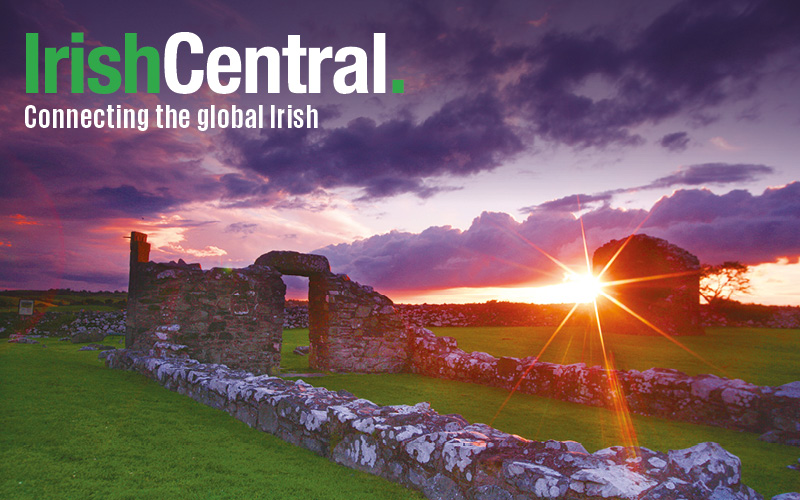The Irish government played a major behind-the-scenes role in persuading the St. Patrick’s Parade Committee in New York to allow a gay group into the parade.
The Irish Consulate in New York launched a major effort to change the rules following the embarrassment last year of Taoiseach Enda Kenny being openly challenged by gay groups and media about marching in the parade.
Kenny had expected a wonderful opportunity to showcase Ireland. Instead he became embroiled in a bitter battle over gay rights.
Former Consul General Noel Kilkenny, now Ambassador to Greece, held several closed-door meetings with the committee and warned them it was highly unlikely the Irish government would continue its support as long as gays were barred.
Kilkenny was the one outsider who had real impact on the parade deliberations. The support of the Irish government is critical to the parade organizers.
Despite that, relations between the government and the parade chairman John Dunleavy deteriorated when it soon became clear that Dunleavy was intent on keeping the ban.
At 75 Dunleavy had ruled the parade with an iron fist for decades brooking no argument on the gay issue.
He was kept in power by a similar group of older Irish-born emigrants, mainly from rural Ireland who dominated the parade voting block.
Deeply conservative and Catholic the gay lifestyle was unacceptable to them in any form in the parade.
Despite the massive shift in perceptions on gay rights the parade remained unmoved for decades until this year.
Observers of the parade are still dumbfounded it took so long to reach a resolution of an issue that year after year made the parade a hugely divisive event.
This year however, the ban was breached. As more sponsors made clear they would boycott the event, a revenue document drawn up by the parade financial officials revealed that they were headed for financial disaster.
Guinness, Heineken, the Ford Motor Company had signaled their withdrawal and others were under pressure to do so. A financial crisis loomed.
“There was enough for one more parade then no more money in the kitty” a parade source stated, “We were staring disaster in the face.”
The final straw came when NBC told the parade they were ending the television coverage, the lifeline for the parade.
The parade could not survive without the television coverage which has been a massive component of the advertising revenue.
Irish American members of the parade committee who were far more open to a gay group marching made clear to Dunleavy that the issue had to be addressed.
They were led by parade Vice Chairman Dr. John Lahey, President of Quinnipiac University in Connecticut, who has been the heir apparent to Dunleavy for many years.
Insiders say the involvement of Cardinal Dolan was critical.
Dolan, who vacationed privately in Ireland this summer has a deep and abiding interest in his Irish heritage, unlike his predecessor Cardinal Egan.
A key parade committee member discussed the issue with Dolan and clearly got his approval for the move to save the parade.
The fact that he has agreed to be Grand Marshal further solidified that he was comfortable with breaking precedent and allowing a gay group to march.
The social justice context of the teachings of Pope Francis who famously declared, “Who am I to judge” when asked about gays also came into play. Under Benedict it is highly unlikely Dolan could have countenanced being grand marshal of a parade allowing a gay organization.
The combined weight of the Irish government, the sponsors, the Irish American business leaders and the cardinal’s approval was finally enough to shift the momentum.
Dunleavy cut a lonely figure on the podium as the statement allowing gays to march was read out at the New York Athletic Club ballroom on Monday night. He never spoke during the event which was covered by a horde of media.
The announcement was met with a round of prolonged applause; a surreal moment given that most in the room had fought the inclusion tooth and nail for many years.
But there was also a deep sense of weariness about the issue and a dawning realization something had to be done.
The something was not to everyone’s liking on either side. The group given permission to march out@nbcuniversal seemed to violate the very tenet of the march that they have an obvious Irish association and Irish gay groups understandably complained.
On the other hand Cardinal Dolan was coming under attack from the religious right for allowing such a group to march.
In the end however, it seems certain the issue has been defused.
The New York Times pegged it as historic and said “The decision is a striking reflection of the evolution of gay rights in the city and in American society, and is a measure of changing attitudes in the hierarchy of the Roman Catholic Church.”
That seemed a fair summation of a week that will be long remembered by the Irish American community.




Comments